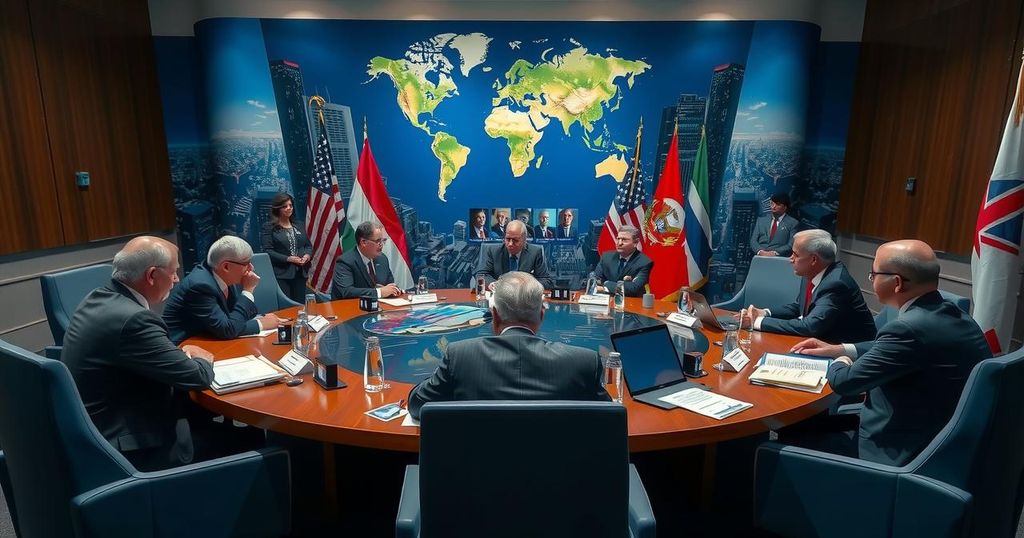G20 Leaders Converge in Brazil to Tackle Global Challenges and Climate Issues

G20 leaders convened in Brazil to address vital issues such as the Middle East and Ukraine conflicts, climate change, and the political ramifications of Donald Trump returning to power. The summit aims for consensus on these matters amidst significant geopolitical tensions and a backdrop of ongoing wars. Brazilian President Lula da Silva emphasized poverty and climate action as critical points, while the dynamic presence of global leaders adds complexity to discussions on these pressing challenges.
Leaders of the G20 nations have gathered in Brazil to deliberate on several pressing global issues, including conflicts in the Middle East and Ukraine, the climate crisis, and the political landscape surrounding Donald Trump’s resurgence. The summit, hosted in Rio de Janeiro on Monday and Tuesday, is taking place amidst significant geopolitical tensions and aims to break the deadlock in climate discussions. Brazilian President Luiz Inácio Lula da Silva emphasized critical topics such as hunger, climate initiatives, and tax reforms targeting billionaires during his opening address. As discussions unfold, the complexities of the ongoing wars and their implications for international relations remain at the forefront, with some member countries advocating for revisions to the draft communiqué to address these matters comprehensively. US President Joe Biden, participating in what could be his final G20 summit, finds himself in a challenging political position as he navigates discussions dominated by the influence of Chinese President Xi Jinping. Additionally, Biden recently altered US military policy by permitting Ukraine to strike deeper within Russian territory, a move that may influence European allies’ strategies. The summit’s agenda also includes addressing stalled UN climate discussions ahead of COP29 in Azerbaijan, where the urgent need for $1 trillion in climate financing for developing nations is a major concern. The leaders’ commitment to climate action is accentuated by the call from UN Secretary-General Antonio Guterres for the G20, comprising 80 percent of global emissions, to demonstrate leadership in achieving an impactful environmental agreement. The gathering is marred by heightened security following an attempted terrorist act targeting Brazil’s Supreme Court, which only underlines the tense atmosphere in which these discussions are occurring. President Lula underscored the importance of not allowing wars to overshadow other humanitarian issues, stating that addressing poverty and the challenges faced by those not involved in conflicts is equally crucial to the international agenda. The summit is also characterized by a focus on taxation of wealthy individuals, with Brazil advocating for reforms in this area amid varied responses from other G20 members, particularly Argentina, which has expressed reservations about some proposals.
The G20 summit acts as a crucial platform for the world’s largest economies to address significant geopolitical and environmental concerns. The 2023 summit in Brazil comes at a time when many nations are grappling with the consequences of two major wars: the ongoing conflict in Ukraine and tensions in the Middle East. Furthermore, climate change remains a central issue that necessitates collective action and funding, particularly for developing nations. As global leaders convene, they aim to find common ground on these contentious topics to forge a path toward diplomacy and collaboration, despite divergent national interests.
In summary, the G20 summit in Brazil brings together leaders to tackle pressing global issues, including longstanding conflicts, climate change, and economic inequalities. While the agenda is ambitious, the potential for a unified outcome remains uncertain due to differing national priorities and political dynamics, exemplified by the contrasting approaches of member states. The meetings are set against a backdrop of heightened security and intense scrutiny, highlighting the critical nature of the discussions taking place. The outcome of this summit could significantly influence international relations and climate policy in the coming years.
Original Source: www.france24.com








